German History
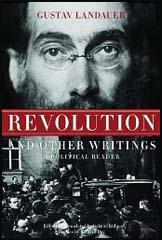
Title: Revolution and Other Writings
Author: Gustav Landauer
Publisher: Merlin Press
Price: £19.99
Bookshop: Amazon
Spartacus Website: Gustav Landauer
Category: German History
"Landauer is the most important agitator of the radical and revolutionary movement in the entire country." This is how Gustav Landauer is described in a German police file from 1893. Twenty-six years later, Landauer would die at the hands of reactionary soldiers who overthrew the Bavarian Council Republic, a three-week attempt to realize libertarian socialism amidst the turmoil of post-World War I Germany. It was the last chapter in the life of an activist, writer, and mystic who Paul Avrich calls "the most influential German anarchist intellectual of the twentieth century." This is the first comprehensive collection of Landauer writings in English. It includes one of his major works, Revolution, thirty additional essays and articles, and a selection of correspondence. The texts cover Landauer's entire political biography, from his early anarchism of the 1890s to his philosophical reflections at the turn of the century, the subsequent establishment of the Socialist Bund, his tireless agitation against the war, and the final days among the revolutionaries in Munich. Additional chapters collect Landauer's articles on radical politics in the US and Mexico, and illustrate the scope of his writing with texts on corporate capital, language, education, and Judaism. The book includes an extensive introduction, commentary, and bibliographical information, compiled by the editor and translator Gabriel Kuhn as well as a preface by Richard Day.
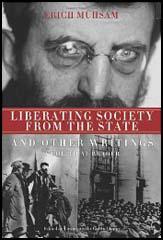
Title: Liberating Society from the State
Author: Erich Mühsam
Publisher: Merlin Press
Price: £17.21
Bookshop: Amazon
Spartacus Website: Erich Mühsam
Category: German History
Erich Mühsam (1878-1934), poet, bohemian, and revolutionary, was born into a middle-class Jewish family, he challenged the conventions of bourgeois society at the turn of the 19th century, and engaged in heated debates on the rights of women and homosexuals. A primary instigator of the ill-fated Bavarian Council Republic in 1919, he worked to keep radical and libertarian thinking alive during the Weimar Republic. Arrested four weeks after Hitler's ascension to power, he spent the last sixteen months of his life in detention and was murdered in the Oranienburg Concentration Camp in July 1934. Mühsam wrote poetry, plays, essays, articles, and diaries. His work unites a burning desire for individual liberation with anarcho-communist convictions, and bohemian strains with syndicalist tendencies. The body of his writings is immense, yet hardly any English translations exist. This collection presents not only Liberating the State from Society: What is Communist Anarchism?, Mühsam's main political pamphlet and one of the key texts in the history of German anarchism, but also some of his best-known poems, unbending defenses of political prisoners, passionate calls for solidarity with the lumpenproletariat, recollections of the utopian community of Monte Verità, debates on the rights of homosexuals and women, excerpts from his journals, and essays contemplating German politics and anarchist theory as much as Jewish identity and the role of intellectuals in the class struggle. An appendix documents the fate of Zenzl Mühsam, who, after her husband's death, escaped to the Soviet Union where she spent twenty years in Gulag camps.
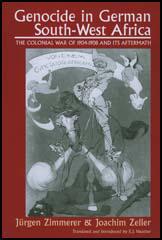
Title: Genocide in German South-West Africa
Author: Jurgen Zimmerer & Joachim Zeller
Publisher: Merlin Press
Price: £15.99
Bookshop: Amazon
Spartacus Website: Kaiser Wilhelm II
Category: Military History
Early in 1904 war broke out in German South West Africa, when the Herero tribe rose up against an oppressive colonial regime. The German army despatched to the colony brutally suppressed the uprising and set about the systematic annihilation of the Herero and Nama people. This collection of essays considers many aspects of this war of extermination. Edward Neather adds an introduction that situates these events in the context for the great African land rush by European powers and shows how racism, concentration camps and genocide in the German colony foreshadow the crimes committed during Hitler'ss Third Reich.
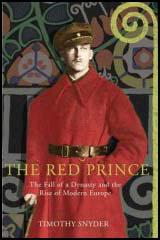
Title: The Red Prince
Author: Timothy Snyder
Publisher: Bodley Head
Price: £20.00
Bookshop: Amazon
Spartacus Website: Spies and Spymasters
Category: Russian History
The first ever biography of the extraordinarily colourful Archduke Wilhelm von Habsburg (1895-1947). Tattooed, bisexual, crossdressing, multilingual, he was a major - & symbolic - figure in 20th-century European culture & politics. Born into one of the great European dynasties with every expectation of a glittering future, instead he became a playboy in Paris during the 1930s and died – a spy for Britain - under interrogation in a Soviet prison. The arc of Wilhelm’s life therefore describes the dying fall of the ancien régime – the Europe of his birth bears very little resemblance to that of his death.
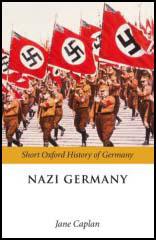
Title: Nazi Germany
Author: Jane Caplan
Publisher: Oxford University Press
Price: £50.00
Bookshop: Amazon
Spartacus Website: Nazi Germany
Category: German History
The history of National Socialism as movement and regime remains one of the most compelling and intensively studied aspects of twentieth-century history, and one whose significance extends far beyond Germany or even Europe alone. This volume presents an up-to-date and authoritative introduction to the history of Nazi Germany, with ten chapters on the most important themes, each by an expert in the field. Following an introduction which sets out the challenges this period of history has posed to historians since 1945, contributors explain how Nazism emerged as ideology and political movement; how Hitler and his party took power and remade the German state; and how the Nazi 'national community' was organized around a radical and eventually lethal distinction between the 'included' and the 'excluded'. Further chapters discuss the complex relationship between Nazism and Germany's religious faiths; the perverse economic rationality of the regime; the path to war laid down by Hitler's foreign policy; and the intricate and intimate intertwining of war and genocide, with a final chapter on the aftermath of National Socialism in postwar German history and memory.
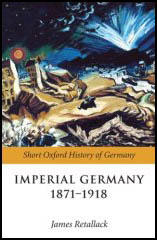
Title: Imperial Germany 1871-1918
Author: James Retallack
Publisher: Oxford University Press
Price: £50.00
Bookshop: Amazon
Spartacus Website: Germany 1900-45
Category: German History
The German Empire was founded in January 1871 not only on the basis of Chancellor Otto von Bismarck's 'blood and iron' policy but also with the support of liberal nationalists. Under Bismarck and Kaiser Wilhelm II, Germany became the dynamo of Europe. Its economic and military power were pre-eminent; its science and technology, education, and municipal administration were the envy of the world; and its avant-garde artists reflected the ferment in European culture. But Germany also played a decisive role in tipping Europe's fragile balance of power over the brink and into the cataclysm of the First World War, eventually leading to the empire's collapse in military defeat and revolution in November 1918. With contributions from an international team of twelve experts in the field, this volume offers an ideal introduction to this crucial era, taking care to situate Imperial Germany in the larger sweep of modern German history, without suggesting that Nazism or the Holocaust were inevitable endpoints to the developments charted here.

Title: Weimar Germany: Promise and Tragedy
Author: Eric D. Weitz
Publisher: Princeton University Press
Price: £17.95
Bookshop: Amazon
Spartacus Website: Weimar Republic
Category: Travel Writing
Weimar Germany still fascinates us, and now this complex and remarkably creative period and place has the history it deserves. Eric Weitz's new book reveals the Weimar era as a time of strikingly progressive achievements - and even greater promise. With a rich thematic narrative and detailed portraits of some of Weimar's greatest figures, this comprehensive history recaptures the excitement and drama as it unfolded, viewing Weimar in its own right - and not as a mere prelude to the Nazi era. "Weimar Germany" tells how Germans rose from the defeat of World War I and the turbulence of revolution to forge democratic institutions and make Berlin a world capital of avant-garde art. Setting the stage for this story, Weitz takes the reader on a walking tour of Berlin to see and feel what life was like there in the 1920s, when modernity and the modern city - with its bright lights, cinemas, "new women," cabarets, and sleek department stores - were new. We learn how Germans enjoyed better working conditions and new social benefits and listened to the utopian prophets of everything from radical socialism to communal housing to nudism. "Weimar Germany" also explores the period's revolutionary cultural creativity, from the new architecture of Erich Mendelsohn, Bruno Taut, and Walter Gropius to Hannah Hoch's photomontages and Bertolt Brecht and Kurt Weill's theater. Other chapters assess the period's turbulent politics and economy, and the recipes for fulfilling sex lives propounded by new "sexologists." Yet "Weimar Germany" also shows how entrenched elites continually challenged Weimar's achievements and ultimately joined with a new radical Right led by the Nazis to form a coalition that destroyed the republic. Thoroughly up-to-date, skillfully written, and strikingly illustrated, "Weimar Germany" brings to life as never before an era of creativity unmatched in the twentieth century-one whose influence and inspiration we still feel today.
